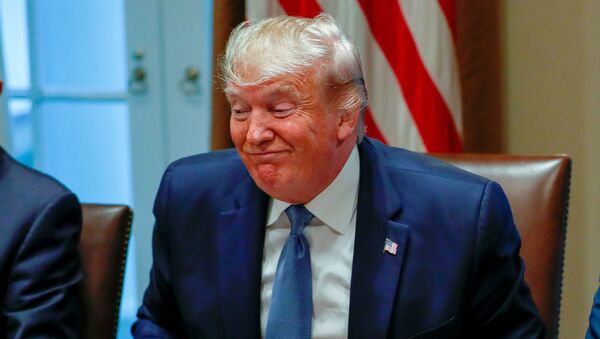A fact-checking website Politifact named Trump’s comments on the whistleblower complaint regarding his phone talk with Ukraine’s president Zelensky the title of “lie of the year.”
“Trump has claimed more than 80 times that the anonymous whistleblower's complaint was ‘fake, fraudulent, incorrect, ‘total fiction,’ ‘made up’ and ‘sooo wrong’ since its release,“ the website noted.
The declassified complaint text published by CNN does, in fact, follow the content of the phone call, a transcript of which was also declassified and published online.
According to the complaint, in which the whistleblower acknowledges having no first-hand knowledge of the call, Trump asked Zelensky a “favor” to “initiate or continue an investigation” into Joe Biden and his son Hunter, and “assist in purportedly uncovering that allegations of Russian interference in the 2016 US presidential election originated in Ukraine.” Trump also asked Zelensky to “meet or speak with two people the President named explicitly as his personal envoys,” those two being Rudy Giuliani and William Barr.
The complaint alleged that Trump “abused his office for personal gain.” The slippery point is whether asking for a “favor” constitutes an “abuse of office” or not.
According to the House Democrats, Trump’s pleas for “favors” were supplemented by a so-called “quid pro quo,” or political extortion. The Dems claimed Trump conditioned military funding for Kiev, withheld earlier in May, on completion of the “favors” outlined in the call.
In their complaint, the whistleblower makes no mention of financial aid or any condition during the phone call, but says some US officials told them that Trump somehow conditioned a personal meeting with Zelensky on those “favors.”
“Multiple US officials told me that the Ukrainian leadership was led to believe that a meeting or phone call between the President and President Zelensky would depend on whether Zelensky showed willingness to "play ball" on the issues that had been publicly aired,” the complaint reads.
This “quid pro quo” notion mostly constitutes the ground for the ongoing impeachment. The inquiry has been mired in unsuccessful attempts to draw a definitive line between the “favors” and any kind of conditions. If such conditioning did exist, hard evidence remains elusive.
It comes as no surprise then that Trump repeatedly blasted the impeachment as a “witch hunt,” complete with such adjectives as “insane,” “one-sided” and “the single greatest,” joined by Republicans who keep pointing out that the Dems failed to prove their allegations with hard evidence.
While Trump’s reaction of abrasive dismissal to the complaint was rightfully marked as a “lie,” Politifact could check the Dems’ allegations of “quid pro quo” and “abuse of office”, for the sake of impartiality.


